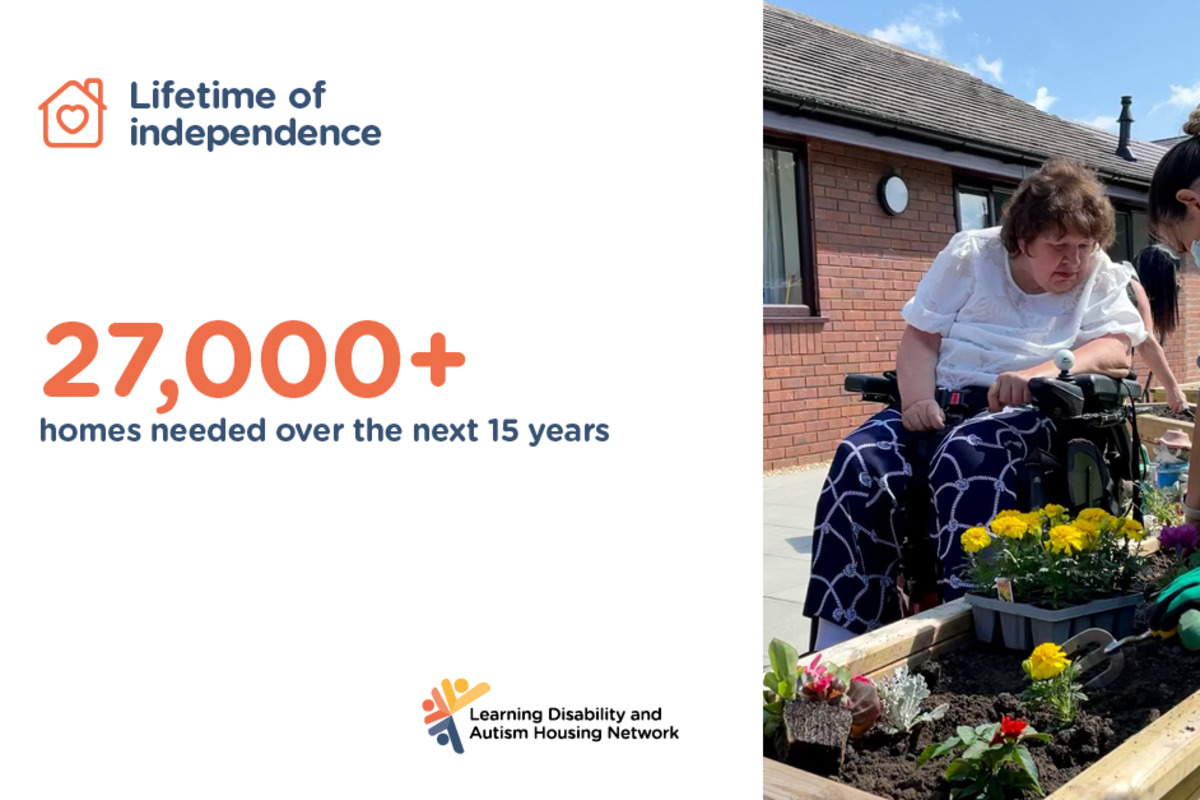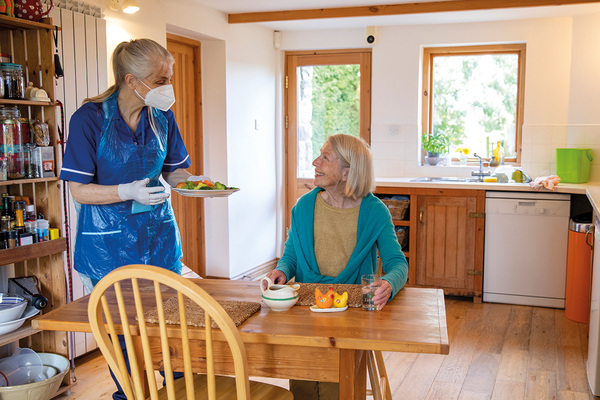You are viewing 1 of your 1 free articles

John Verge is chief executive of Golden Lane Housing, and chair of the Learning Disability and Autism Housing Network
It is time for great change in the provision for supported housing for people with learning disabilities and autistic people
A new important report from the Learning Disability and Autism Housing Network provides key recommendations for supported housing for people with learning disabilities and autistic people, writes John Verge
Good-quality supported housing can be transformational for people with learning disabilities and autistic people, as it offers greater opportunity to live fulfilling, independent lives in their communities. It helps many people who have been living with parents support the independence they want.
It can be far more cost effective too and provide a far better quality of life than living in inappropriate, expensive institutions.
There are a number of great housing providers across the country who working with their local authority and health commissioners are providing and developing much-needed supported housing. But over recent years, some supported housing provision has been under significant political, regulatory and media criticism.
Last autumn, the Levelling Up, Homes and Communities Committee published its inquiry report on exempt supported accommodation. It was certainly damning on parts of the supported housing sector and raised some important systemic issues.
It pointed to poor strategic planning, poor government data, lack of standards and regulatory oversight. Consequently, a new private members’ bill introduced by Bob Blackman MP is now awaiting Royal Ascent to respond to some of their recommendations.
The Public Accounts Committee also recently commissioned a supported housing inquiry focusing on oversight, spend, data and proposals for change. There has also been ongoing criticism by the Regulator of Social Housing on some long-term lease models in the sector.
On 5 July, a new report called Supported housing for people with learning disabilities and autistic people in England – commissioned from Housing LIN by the Learning Disability and Autism Housing Network, a coalition of more than 20 housing associations – was published with the aim of providing data, information and insight about supported housing for people with learning disabilities and autistic people.
The research provides a comprehensive evidence base of the scale, scope, cost and future need of supported housing. The report sets out clear recommendations that the network firmly believes will help address many of these issues.
The research establishes that more than 35,500 people are living in supported housing with commissioned care and support, with an equivalent number of people with commissioned care and support living in mainstream housing, predominantly general needs social housing.
“Our call to government is to support new provision by increasing the level of capital funding and reforming the outdated rent standard that has stifled new public funded provision”
Over 80% of the supported housing provision in this sector is provided by housing associations. The majority of tenants living in supported housing have significant support needs, with over 43% of people receiving over 100 hours a week of care and support.
Over 83% of supported housing tenants require higher levels of ‘specified’ housing benefit and over 58% live in specialised supported housing – which is exempt from the Rent Standard – where there are high levels of care and support and limited or no public capital subsidy.
The report suggests that more than 5,500 new homes have been created over the past five years, with only 13% of the funding provided by public grant subsidy, largely NHS England housing capital funding specifically for helping people move from hospitals.
The evidence reflects our experience at Golden Lane Housing, where we have not been able to utilise Homes England grant funding from either the Affordable Homes Programme or the Care and Support Specialised Housing Fund. Our member analysis shows that we require over 75% grant levels to achieve affordable or social rent levels to meet the housing requirements of people with high support needs.
Housing LIN estimate that more than 1,800 additional homes are needed each year over the next 15 years – that’s 27,000 individuals – which will require over £340m per year of private and public funding. It is clear that even with increased grant funding, the sector requires significant input from private finance and needs to develop a model that supports new provision with private finance that is sustainable, reasonable and provides good-quality, secure housing for people.
The reality is that demand from individuals, their families and commissioners is exceeding supply and if we are going to respond to this need with quality housing and viable funding, things need to significantly change. Our call to government is to support new provision by increasing the level of capital funding and reforming the outdated Rent Standard that has stifled new public funded provision.
The government needs to be set and publish annual targets for supported housing for people with learning disabilities and autistic people. Significant parts of the sector continue to be reliant on higher housing benefit levels due to the additional cost of specialist housing and lack of grant funding, and we require the government to maintain the current housing benefit regime.
We welcome the upcoming Supported Housing (Regulatory Oversight) Bill and we want to ensure it introduces proportionate oversight to drive up standards and recognise the difference between non-commissioned, short-term housing and lifetime, commissioned homes.
Our call to local authorities is to develop and publish regular supported housing strategies that properly address future housing for people with learning disabilities and autistic people. Importantly, any strategy will only deliver new solutions if local and health authorities work together with housing providers.
“It is vital that housing providers evidence the value for money and positive impact that good-quality specialist housing provides to society and, most importantly, for people with learning disabilities and autistic people”
Our report highlights a current vacancy rate of over 10% across the learning disability and autism sector, and local authorities need to work with housing and support providers to make better use of existing accommodation.
Our call to housing providers is to play an increased, critical role working with adult social care and health authorities to support new provision. Over recent years, many longstanding larger housing associations have stopped developing and providing supported housing, often citing other priorities, increased complexity and uncertainty over funding.
There could be opportunities to work alongside specialist providers to support new provision as part of housing associations’ refocus on their core purpose linked to delivering the recommendations of the Better Social Housing Review.
Housing providers must also embrace the new national standards that the bill will introduce and positively respond to the criticisms of unjustifiable rents by evidencing the clear reasons why some supported housing is more expensive. It is vital that housing providers evidence the value for money and positive impact that good-quality specialist housing provides to society and, most importantly, for people with learning disabilities and autistic people.
It is clear that good-quality supported housing has a vital role to play to change people’s lives and provide a lifetime of independence. Now is the time for all key parties to come together to respond to the changes needed to support new provision, provide value for money and ensure high standards across the whole sector.
John Verge, chief executive, Golden Lane Housing, and chair, Learning Disability and Autism Housing Network
Sign up for our care and support bulletin
Already have an account? Click here to manage your newsletters












